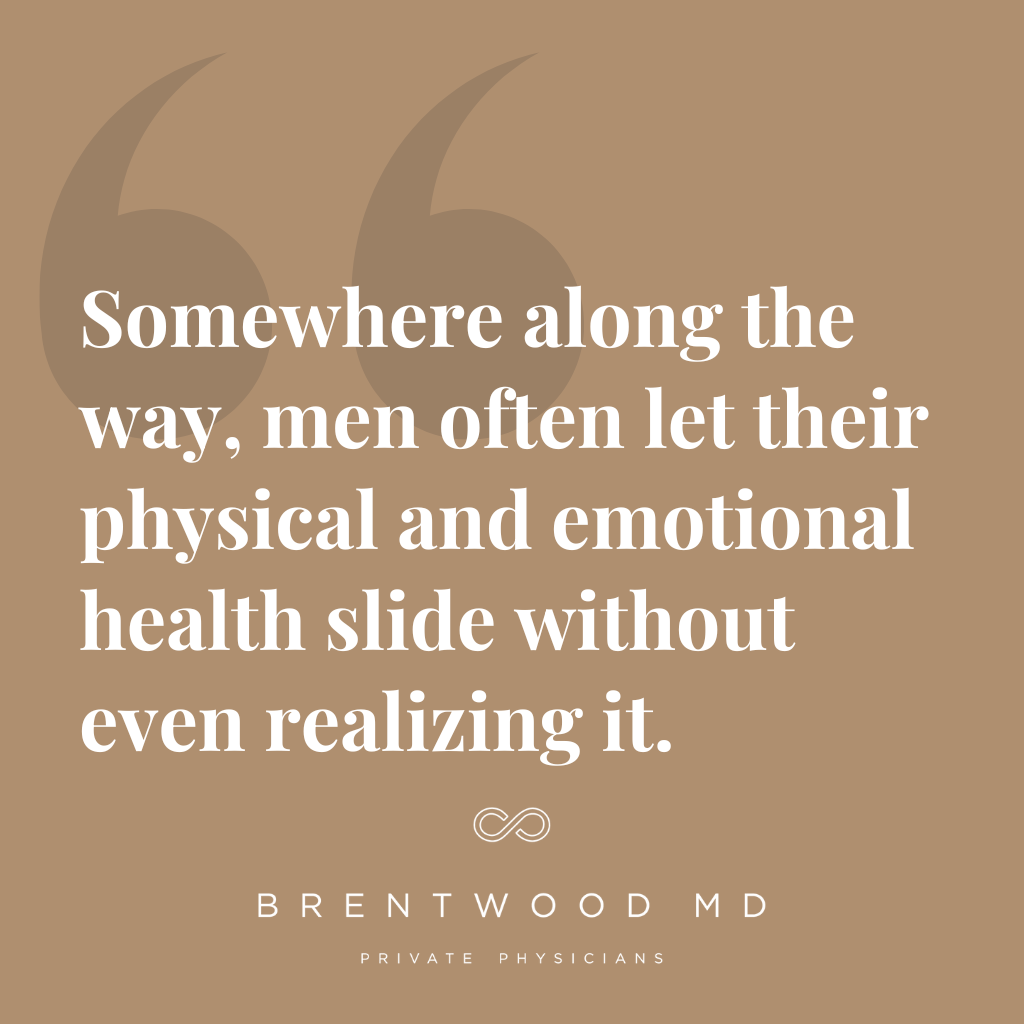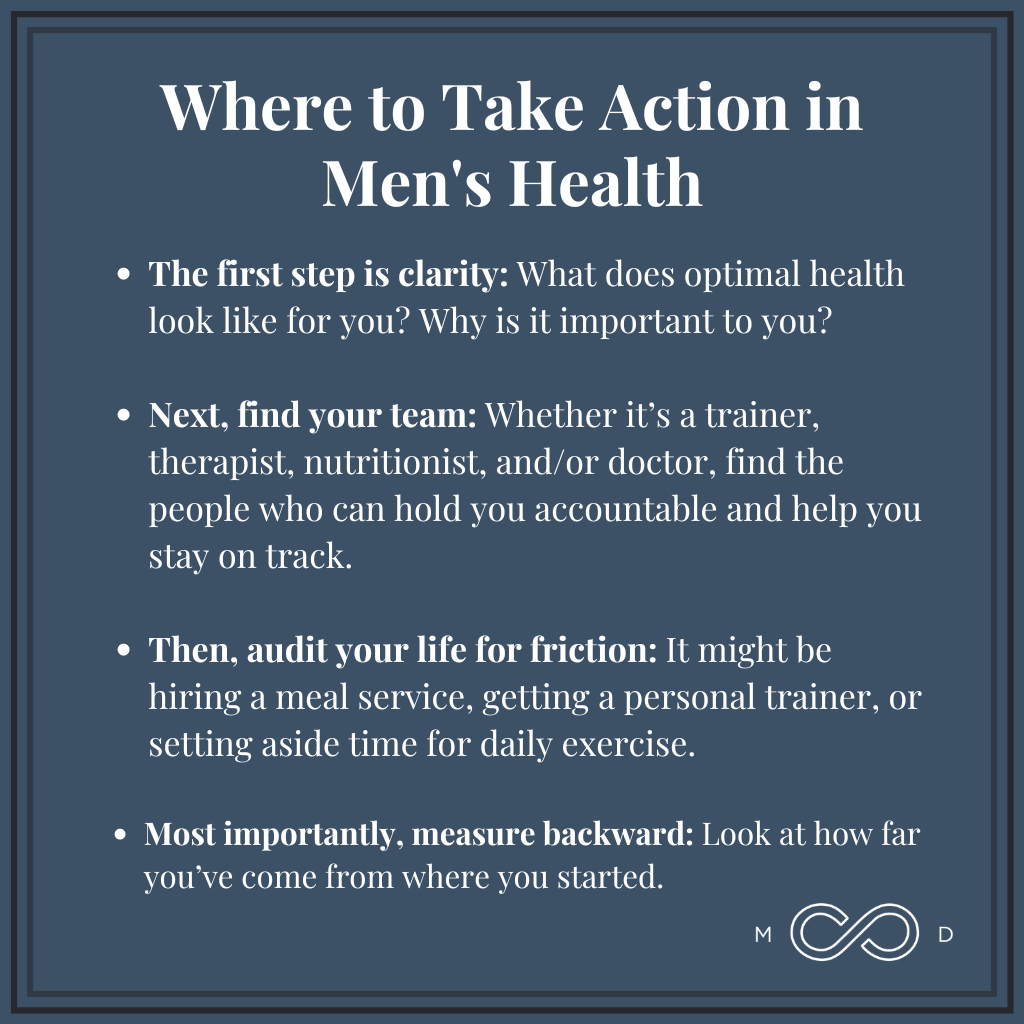Download file | Play in new window | |
There’s a pattern I’ve observed over the years working with men — particularly high-achieving men who are deeply dedicated to their families, businesses, and communities. They’re the kind of guys who go all in on everything they do, except for one critical area: their health.
Somewhere along the way, men often let their physical and emotional health slide without even realizing it. And before they know it, they’re facing down serious consequences and wondering, how did I get here?
But it doesn’t have to be that way. Let’s explore why men tend to give up on their health and, just as importantly, how they can fight that tendency.
Obstacles to Physical Health
While no single reason explains why men tend to give up on their health, I’ve observed — and personally experienced — a handful of obstacles that frustrate both physical and mental wellness for many. We’ll look at the physical first:
Health Care vs. Sick Care
One of the biggest barriers I see starts with the difference between health care and sick care. The sick care model revolves around identifying, treating, and managing disease, not promoting optimal health. In fact, it’s very difficult to get truly healthy in a sick care system.
Many men avoid doctors until something’s seriously wrong because they’ve been conditioned to view medical visits as the last recourse when they’re actively sick. The problem, of course, is that this precludes all possibility of active prevention — of avoiding a disease altogether.
A true health care model focuses on preventing and delaying chronic disease by optimizing health. It doesn’t twiddle its thumbs until a person becomes sick enough to be diagnosed with a disease, and then pounce with treatments and medications.
With such a “health” care paradigm at work, it’s no wonder men hold out on going to the doctor. If they’re healthy or “borderline,” the institution has nothing for them. If they’re sick, they could walk out on five different medications — a feeling akin to defeat.
Normal vs. Optimal
The sick care approach doesn’t work if you want to live a long, healthy life. One of the reasons is that it focuses on the concept of “normal” while ignoring the “optimal.”
In my practice, we consider “normal” as the medical term for “average” or “common.” Now, in an average young person, “average” might be pretty good. But as you age up into your 40s, 50s, and 60s, the “average” of your peers looks a lot less healthy.
For this reason, we work with our members to aim for “optimal” vs. “normal.”
Most men instinctively want to go beyond “normal” in other major areas of their lives: business, marriage, and parenting, for example. But the sick care model offers no path to “optimal,” so men tend to put off the pursuit — and eventually give up on it altogether.
The Lie of the Borderline Diagnosis
In the sick care model, we expect to hear that we either have a disease or we don’t. When a doctor tells a man that he has “borderline” diabetes, then the man feels a sense of relief. Whew, escaped that one for another year.
The problem, however, is that this isn’t how disease works.
Disease exists on a spectrum. No one wakes up one day and suddenly has diabetes. The disease develops incrementally over years and even decades. And all that time provides a runway to potentially turn the progression around.
Unless you don’t know that’s an option.
To tell someone they have a “borderline” diagnosis means they’ve already moved out of optimal ranges, into suboptimal ranges, and arrived in early-stage disease. If they don’t make any changes, the progress will just keep marching on.
Using the term “borderline” instead of “early-stage” for a disease imbues a false sense of safety. It implies you’re fine as long as you stay where you are, instead of lighting a fire that motivates change for the better.
Old Strategies for New Problems
Part of the challenge of the sick care model is that physicians are stuck trying to provide care to 30 or 40 patients a day. They’re doing the best they can, but the model itself fights them.
This exhausted reality leaves little time for updating diagnostic methods or reading up on the latest treatment developments. Consequently, many physicians practice exactly the same way they did 10, 20, or 30 years ago, with little exposure to the innovations constantly appearing.
To complicate matters further, the sick care model suffers greatly from its dependence on insurance companies as the primary financial payors. And insurance companies notoriously don’t pay for tip-of-the-spear technologies.
As a result, patients don’t get the care they deserve, and doctors don’t get the incentive or infrastructure to treat patients as they might wish. A care model that doesn’t seem to truly value care isn’t a particularly compelling draw for high-achieving men.
Obstacles to Emotional Health
While physical health is crucial for a long and fulfilling life, mental and emotional well-being play an equally important and interconnected role.
Work-Life Balance: Micro vs. Macro
Work-life balance is a concept that trips many men up. We know we need it, but we don’t necessarily know what a healthy version looks like.
Too many of us think balance means a perfectly linear scale — equal time for work and family at all times. But that’s not what I see in nature. In nature, I see seasons.
At times, you’ll need to go all-in at work, pushing the boundaries of what you thought you could do. And there will be times when you need to pull back, invest more in your family, or focus more on your health.
The problem is, many men try to go all-in on everything at once — running the business, raising the family, maintaining their health — and it doesn’t work. No one has that kind of capacity to spend every day. The key is knowing when to push and when to pull back, creating a macro balance over time.
The Traditional Retirement Mindset
Here’s a harsh truth: retirement, in the traditional sense, is a death sentence. It’s the dream sold to men by the Industrial Revolution. Work with all your might for decades, and at the end, you’ll get to do nothing.
But when you send your mind to pasture, your body follows.
Of course, this regards the traditional, post-Industrial Revolution style of retirement. I don’t mean to suggest you can’t stop working on someone else’s terms. You can! But instead of aiming for nothing, focus on transitioning into work that excites you — something you can continue doing for the next 20, 30, or 40 years.
Humans need purpose. We need a reason to get up in the morning, and it can’t just be about serving ourselves. Having nothing to do is a way to communicate to your nervous system — and to the universe — that you’re finished contributing.
The “I’ll Rally” Fallacy
Here’s another lie men tell themselves: “I’ll rally later.” I’ve heard it a thousand times. “I know I’m out of shape, but I’ll get it together when things calm down.”
The truth? No one rallies. Maybe outliers exist, but for most men, rallying doesn’t happen. What does happen is a crisis — whether it’s a heart attack, a frightening diagnosis, or the realization that you can no longer keep up with your kids. And at that point, it’s often too late to fully reverse the damage.
The key to reclaiming your health isn’t waiting for a time when you can rally. It’s drawing a line in the sand and making a decision. This isn’t about weaning yourself off bad habits. It’s about stopping them altogether.
I speak from experience here. There was a point in my life when I had to fire the version of myself that wasn’t taking care of my health. I’d gone from fit and powerful to hypertensive, with a fatty liver and over 40 pounds of extra weight.
I didn’t rally. I made a decision, and anything that didn’t align with moving toward the optimal version of me was no longer allowed in my life.
Stress Management vs. Stress Elimination
The only person who doesn’t experience stress is the person who isn’t breathing. To be alive is to experience stress.
Every man experiences challenges, and every challenge brings friction and stress. Even when you overcome a challenge and experience some relief, stress always returns at whatever the next stage holds. Success, in fact, doesn’t lead to the removal of stress. It just leads to higher-quality problems.
Certain people seem to be untethered by stress; they navigate through it with some mental framework or system to overcome stress and develop new capabilities. By recognizing that we can’t eliminate stress from our lives, men can avoid discouragement and instead look for intentional ways to manage stress for long-term wellness.
Connected Yet Alone
In our hyper-connected world, we’ve never had more interaction at our fingertips with less authentic connection. So many men with well-recognized names feel completely alone in life. And this, of course, affects any desire to care for their health.
As humans, we crave true connection. And little hurts us more than being surrounded by people yet feeling alone.
The Anti-Health Spiral
I’ve noticed a progression of experiences that seems to lead men to neglect their health, which I’ll outline briefly so you can spot it:
- Inconsistency: If your efforts aren’t consistent, then you won’t see the results you want.
- Unpredictable results: If you can’t depend on the results, you’re discouraged from trying further.
- Compounding losses: When your efforts decrease, your losses accumulate.
- Apathy: The ultimate red flag, where all effort ceases and you wonder what the point is.
- Regret: The emotion I wish no one had to experience at the end of their life, of feeling that you could have done something different, but now it’s too late.
Where to Take Action
We’ve worked with some of the most successful people in the world; in a moment of truly bad news, they would give up every ounce of success, of wealth, of fame to restore their health. But once the runway is gone, it’s gone. The key is to take action while you can still make the turn.
The first step is clarity. Get clear on what you want and why you want it. What does optimal health look like for you? Why is it important to you? Once you have that clarity, you’ll find a way to make it happen.
Next, find your team. This isn’t something you need to do alone. Whether it’s a trainer, therapist, nutritionist, and/or doctor, find the people who can hold you accountable and help you stay on track. If that’s us, amazing. Give us a call. If it’s someone else, equally great. Just find the team you need!
Then, audit your life for friction. Where are your goals and actions out of alignment? Those friction points are where you can focus your efforts. It might be hiring a meal service, getting a personal trainer, or setting aside time for daily exercise. The key is to identify where you’re falling short and make the necessary changes.
Most importantly, measure backward. Don’t get discouraged by how far you are from your ideal self. Instead, look at how far you’ve come from where you started. Progress is what keeps us moving forward, and the only way to see it is by measuring backward, not against the unattainable ideal.
The bottom line is this: If you’re a man who’s been putting off your health, it’s time to stop. There’s no rally coming. There’s only the decision you make today. I’m rooting for you to reclaim your health and live the life you’ve always wanted!

Dr. Aaron Wenzel is a concierge physician specializing in the care of fast-moving entrepreneurs, executives, and public figures in the Nashville, TN area. Dr. Wenzel’s diverse life experience and extensive training in family medicine, emergency care, nutrition, and hormone replacement therapies give him the unique platform to provide unmatched care for his patients.









